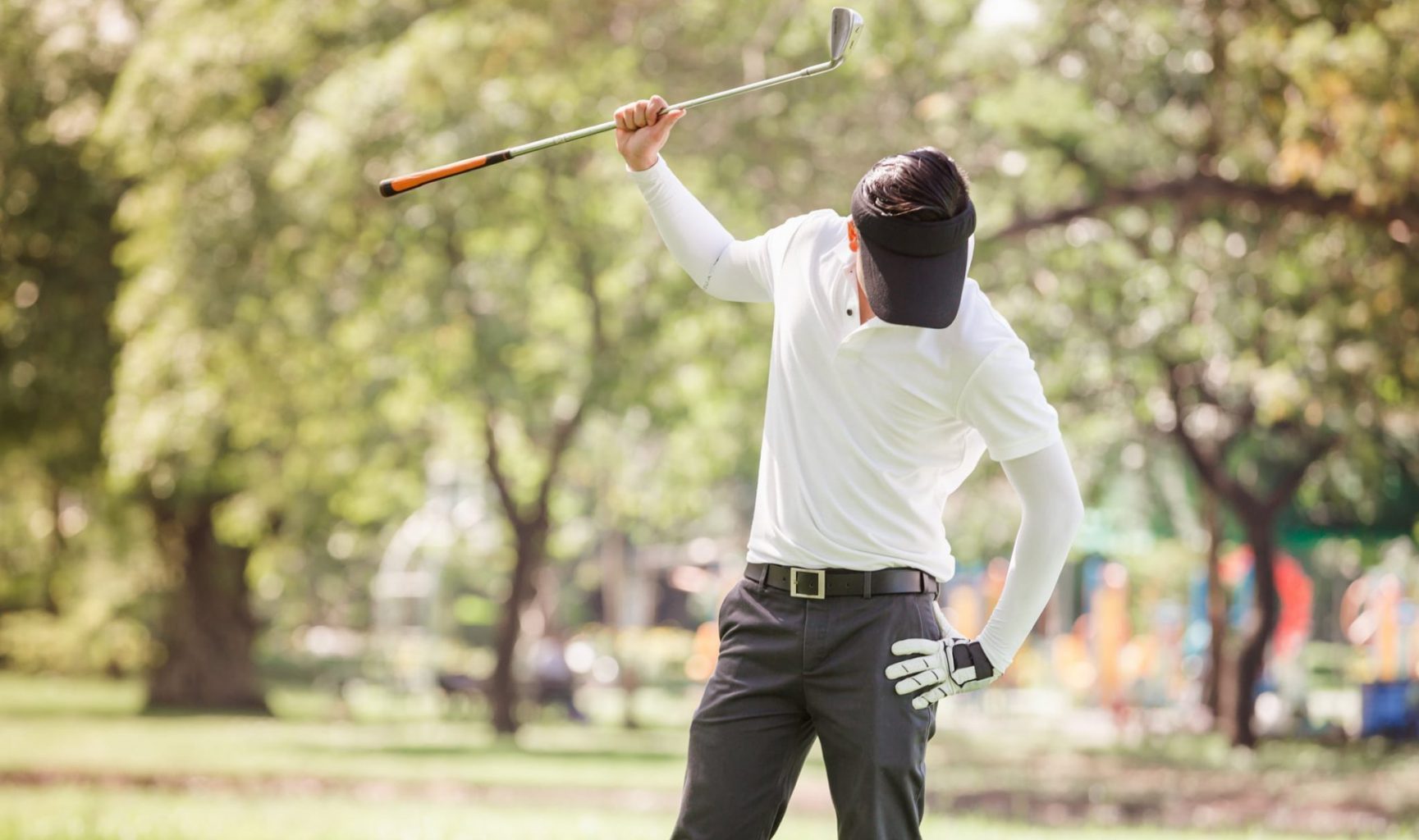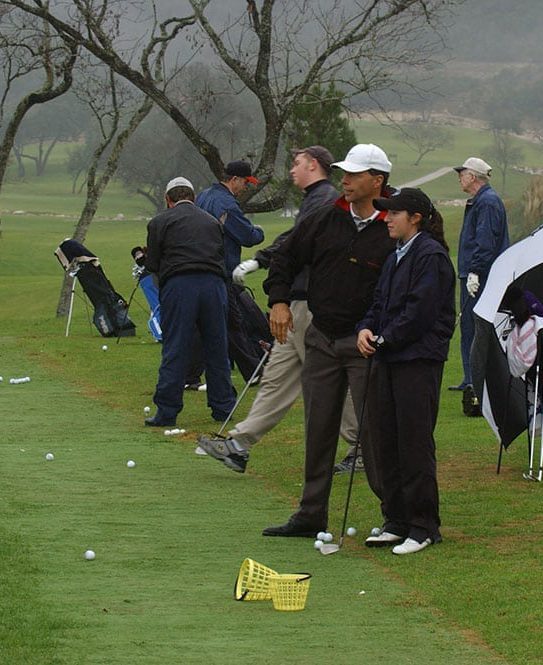Golf Psychology Determines Your Consistency and Performance!
The Golf Industry promotes the ideas that you will be more consistent with better clubs, a perfect swing, muscle memory, lots of range practice, greater golf fitness and consistent pre-shot routines. They don’t speak about the main reasons you are not consistent and the best solution, better Golf Psychology for you.
What is Golf Psychology?
Golf Psychology is the scientific study of the mental game of competitive golfers. Studying and improving the mental game allows a golfer to battle through stress, avoid yips, and improve faster.
Why aren’t you more consistent now? You are working hard on your game.
First Reason- Golf is the most difficult sport!
Simply compare golf to other sports. What other sport has 14 different clubs? Which are used in more than 14 different ways. For example: The sand wedge is used out of the sand, with many different lies and conditions that have to be adjusted for. It is also used for chipping, pitching and for approach shots with many different lies and conditions that have to be adjusted for. One club with an infinite number of possibilities.
The driver and the putter are the simplest clubs because the lie is taken out of the equation. You tee the ball up when playing the driver off any tee box, creating a perfect lie. No adjustment needed. You mark position of your ball on the green, clean it and replace it perfectly. No adjustment for the lie.
The driver may be used to create draws or fades. It puts the ball in play on many holes. This means hitting it well sets up the hole. Hitting it poorly hurts your chances. The physics of the longest club in the bag with a different swing from the other clubs makes it harder to hit well and consistently.
The putter is the simplest club and the shortest, for most people. The stroke is simple. It is judging the green that is difficult. It is the exact result of falling in the hole that determines whether you have played it well.
Every hole is different. Every green is different. Every bunker is different. The rough is different from the fairway. The conditions are changing with the weather. Wet greens are different from dry greens. Firm fairways are different from soft ones. Bermuda grass is different from bent grass. The wind comes from different directions from hole to hole and it is changing. Golf is not played inside.
So the physics and physical requirements are endlessly changing and challenging. Golf is naturally hard to achieve consistent good outcomes without even considering the golfer.
In golf every action is self generated. No reacting to other players or a moving ball. Pitching in baseball and serving in tennis may be the closest but they are limited in the variety of actions you are attempting.
Golf takes a lot of time to play, four plus hours for 18 holes and 70 or so shots. Lots of time between shots. It is like the opposing coach calling time out before every shot so you have time to think about the importance of the result, just like they do in football.
No teammates to play some of the shots. In stroke play golf it is all on you. The score adds up relentlessly and every shot counts. In baseball you can achieve a hit less than 30% of the time and be considered a good player. In tennis you get to serve again. In basketball missing the foul shot is disliked but not unusual. In football you turn the ball over or punt. No blood.
In golf every shot counts.

Second Reason- Golf is hard because you are human.
You are not a machine! Your natural instincts are wrong for golf. Your physical abilities have limits.
Your brain is your control center. Not your muscles. Not your subconscious. No swing or stroke happens without instructions from your brain. All action comes from electric signals from your brain through your nervous system to your muscles causing action.
You are not a machine with a digital chip running programs as designed, producing the same output every time. Machines can achieve incredible consistency.
Approaching golf as if you are a machine is guaranteed to frustrate and limit your performance because you cannot be that consistent. There is no memory in your muscles. Nothing happens without signals from your brain.
The purpose of practicing your swing or stroke should be to make it a natural movement for you, not requiring control or supervision. The purpose of practice should be to help you trust your movement sequence so you do not have to control it. You just do it.
Most swing coaching makes you focus on trying to control the swing or stroke in a certain way which causes disrupting signals to interfere with the practiced sequence of signals. You are told you must remember to make sure you and the club move in certain ways, achieve certain positions, because it is important if you are to be consistent and effective.
Focusing on your Swing Keys during the swing sends signals from your brain that interrupt or confuse the signals that naturally occur with a practiced movement.
It is natural or instinctive to focus on your swing mechanics when you are first learning a movement. It is how we start.
When you first learned to throw a ball you watched others. Then you picked it up, felt it and attempted to move your arm and hand to throw it. Through trial and error, perhaps with some coaching suggestions, you found your way to throw the ball. With practice you could soon do it without thinking about your arm or hand. You learned to aim and imagine throwing the ball at a target. With enough repetitions you might get really good, like a baseball pitcher.
Baseball and throwing a ball are easier than golf. The ball is in your hand. In golf, a club is in your hand and that separates you from the ball. Longer or shorter distance depending on the club and shot. This separation creates a barrier to full feel in executing a shot. The length of the club means the club head is moving much faster than your arms and you can not see it moving, and contacting the ball on full speed swings. You sure cannot control it in that moment of impact. Your nervous system is not fast enough to respond.
So you have to trust your swing and let it happen. Some like to say react to the ball. This is hard to do when the ball is not moving.
Every shot counts! This means that you need to make good choices, then swing well. In putting you need to judge your putts well, then roll them well. Our natural instinct is to approach the shots with lots of attention. We want to hit a good shot. A bad shot outcome hurts our score potential.
This brings our left brain, analytical abilities into play. Unfortunately the Left Brain is not athletic. It does not enhance our athletic skills. You know you are left brained when you are analyzing the shot and making your choices. Your left brain is best for this part.
It is natural to attempt to play the shot with a perfect routine and a perfect swing by paying close attention to every move and alignment and trying to control these moves and judging them as you are doing them because the outcome is so important. You have time to do all these things.
Unfortunately you will fail because your left brain is in control trying to play these golf shots and putts.
Then because every shot counts and the total score is all important to you for lots of reasons, you react to your outcomes emotionally. This is natural. In other sports these emotions can help you play.
These emotions hurt most golfers. Little reactions and big reactions. Positive emotions and negative emotions happen. When they do chemicals are released in to your body that reduce your golf skills.
These chemicals tighten your big muscles a bit. What does that do to your swing?
These chemicals widen your focus, making you more aware of what is going on around you.
These chemicals reduce your fine motor skills, your touch and feel. How does this effect your putting?
These chemicals make your mind busier and reduce intuition. How does this help your decision making?
The bigger the emotional reaction the longer these effects last. Several shots and maybe holes can be hurt by that reaction. You do not recover until the chemicals have been processed through your system.
We call this the emotional or outcome roller coaster. This is one of the biggest reasons for inconsistent play, shot to shot, hole to hole, front nine to back nine. It is natural when you put the pressure on yourself for outcome without being able to manage your thoughts or emotions.
Human Arousal
Then there is the Arousal Problem. Whether you are on the Outcome/Emotional roller coaster or just want to perform well in competition, you will probably be moving up on the arousal scale. Emotional reactions release chemicals that move you up the Arousal scale. Most players have little awareness of their level of arousal unless it is extreme.
We have determined through research with our Mind Meter that there are truly optimum levels of arousal for performance in golf. This is an old Sport Psychology idea. But measuring it has not been possible in action before.
We found that on a 1-10 scale optimum levels for golf is between 4-6. And within this range closer to 4 for putting and short game and closer to 6 for driving and long game.
Players that have no training in managing their thoughts and level of arousal are typically higher than the optimum level of arousal for a golf shot or putt. This is because of their thoughts and lack of awareness and training to manage controlling their mental game.
This shot is important! Your arousal level goes up. This is natural! If it goes above optimum for this shot, then your performance and outcome will be less than optimum. If you do not have awareness of your level of arousal, you cannot figure out why you did not swing as good as you know you can do.
If you do not know it was over-arousal. Then you will probably look to your swing mechanics. This is natural and normal. You want to do better. You want to fix it, fix the problem. Yes, the swing was not your usual but it was because higher arousal changed your body and therefore your swing.
If you focus on your swing, this will make you more left brained and less athletic. It will not lower arousal which was the underlying problem. Players seldom fix the problem by trying to fix their swing on the course.
The things we want to do naturally when in the golf arena are typically bad for our golf. This is really hard to figure it out by yourself.

Third Reason- Bad Golf Psychology Coaching.
And if the first two reasons were not enough to hurt your consistency, then how about some bad advice to insure it.
General Sport Psychology principles are just that: generalized. They have been developed with other, much easier sports. Most Sport Psychologists start with general sport psychology concepts developed with Olympic athletes and college athletes.
Just like the swing advice of focusing on your swing keys makes you left brained and less athletic, therefore less consistent. Bad golf psychology can easily lead you astray.
Most sport psychologists in golf are coming from this background. Some have education and some don’t. There is no control over who calls themselves a sport psychologist. No licensing to practice golf psychology. Buyer beware.
There are three fundamental skills or foundation skills for your mental game, for everyone’s mental game. You need a method of focusing. You need methods for controlling your thoughts. You need awareness of and ability to manage your level of arousal.
Current Generally Recommended Focus Method- The Pre-Shot Routine
Most sport psychologists and teaching pros promote a consistent pre-shot routine to enable good focus, promising if it is consistent that you will be consistent. The problem is in the implementation.
The number of steps you take to the ball, the way you set up to the ball, checks for alignment, checking posture and grip, number of practice swings or waggles, looks at the target, swing keys are all typical of the details of most pre-shot routines. Many also include a look at the target and imagining the ball flying to the target.
When the shot is important or you are competing then you naturally make doing these steps really important to remember. You do them carefully with lots of attention. Generally, this is done Left Brain in control, critiquing and judging your steps.
All of this can be done Left Brained and usually is. So of course you will be inconsistent because the Left Brained routine is not putting you into an athletic mode or zone over the ball. If you have any anxiety while swinging, then arousal jumps and the outcome is really in doubt.
The advice to do a consistent pre-shot routine is dogma. Everyone teaches it and players accept and try to do it faithfully. You don’t understand how it could be hurting your efforts. It is not obvious. You are doing what comes naturally.
We can help you understand what you need to do mentally to play any shot well. We call it the Athletic Shot Process. It will have you over the ball, Right Brain in charge, athletically and freely swinging. We use our Mind Meter to confirm that you are mentally in the Right place while playing the shot or putt.
Controlling Your Thoughts-
Don’t think about a pink elephant. What did you just think of? Telling yourself not to think about something usually doesn’t work. Don’t think about the water or the OB. Where does the ball go?
Very few can actually tell themselves not to think about something and do well controlling their thoughts.
Everything in golf centers on your outcomes and your score. You naturally try to do everything you can think of to score and not to make mistakes. This leads you right back to doing a great pre-shot routine and trying to make perfect swings.
So your goal for your golf and your attitude about your golf lead you into thinking about things that raise arousal and make you more Left Brained. They need to change.
You also need to be aware of the thoughts that create problems for you; raise arousal, increase anxiety, increase emotions, focus on outcomes and score or distract from the round. When you identify the problem thoughts you need to change them. Remember “Don’t think about that.” doesn’t work.
Replacing the problem thoughts is key. Take your mind from the problem thought to one that helps you relax, gain confidence and let go of the round between shots. A previous great round or shot can work well.
During the shot, our Athletic Shot Process occupies your mind with thoughts that help you be athletic and swing freely, confidently.
We have a number of Thought Control techniques including the Athletic Shot Process, the Circle or Bubble, Regulating Thoughts, Object Meditation, Breathing and Cues. Each needs to be customized to work well for you.
Arousal Control-
The third foundation skill for your mental game is awareness of and the ability to manage your level of arousal for the shot you are playing. Every player needs this.
Higher arousal is not just muscle tension or high heart rate. Those may be present. It is how up you are. How busy your mind is. It may have emotional components or not. You can clearly sense it lowering if you were higher. In our culture we tend to live in a higher arousal state and it can feel normal.
There is nowhere in our educational system that we are taught to sense our level of arousal or modify it. There have been stabs made at it in golf but almost none that work well for golf. If you learn a good peaceful awareness meditation you will have a much greater ability to manage yourself. Abdominal breathing is very helpful with practice.
 We invented and developed the Mind Meter to address this problem. The first Mind Meter was released in 2004. With it we were able to do research with the Tour Pros to discover the optimum arousal ranges for golf.
We invented and developed the Mind Meter to address this problem. The first Mind Meter was released in 2004. With it we were able to do research with the Tour Pros to discover the optimum arousal ranges for golf.
Conceptually, on a 1-10 scale we discovered the range between 4-6 to be optimum with 4 for putting and short game and 6 for driver and full swings. The Mind Meter has a range from 00 to 99 with 99 being extremely high arousal. In reality, every person is different. Their optimum ranges on the Mind Meter may be different. But the relationship was solid. Higher for long game and lower for short game.
Think about your last round of golf. Were you the most relaxed during the round on the greens?
Is there any part of your game with problems that create anxiety while approaching and over the shot? Your arousal is probably above the 6 level for these shots. So they don’t work well and anxiety is increased through this experience.
With the Mind Meter we can help you raise your awareness of your level of arousal. We can help you find your optimum levels of arousal for golf. With the Mind Meter you can practice and play (not in competition) with optimum arousal and know that you are doing well. It gives you objective guidance to work with.
It helps us identify the problem thoughts when they are happening. It helps us know when you are Left Brained during the shot and when you are athletic and Right Brained during the shot. It shows reactions to misses. You may not throw a club but the Mind Meter and your body language will tell the story.
We use the Mind Meter extensively in our individual coaching and our schools. It is available for sale.
Those are the Three Foundation Skills for Your Mental Game. But they are just part of your golf psychology.
Your Golf Psychology
Your golf psychology is unique to you. It is the combination of the fundamental mental skills of focusing, managing your thoughts and managing arousal which are all effected by your attitude, personality, wellness and experience or history. The way you are operating is a result of all these things combined overlaid on the competitive golf situation.
Your golf psychology is the biggest determinant of your level of consistency and performance. Yes, your physical skills and equipment contribute. Yes the game is hard. But the old saying, “golf is 90% mental” is true.
Through our studies of the Tour Pros, we discovered that your Personality has the most impact on your golf psychology , your mental game and performance.
We discovered that the frequent winners on the LPGA Tour, PGA Tour and Champions Tour had 8 of 32 personality traits in common. The other Tour players did not line up with the frequent winners on these 8 Champion Traits.
What do the frequent winners do that makes them frequent winners? What do they do or have that sets them apart and makes them more successful in tournament golf? This is the hidden answer, their advantage.
For example: If you don’t line up with the Champion level of Self-Assurance, then the outcome of every shot becomes much more important and your score becomes super important to you and how you feel about yourself. This will raise your arousal level above optimum for golf and make it less likely that you will execute shots well. It will make you more emotional than usual on the course.
You can practice endlessly and develop great skills that impress everyone on the range but when it comes time to demonstrate those skills in competition, in front of others, you are likely to fail because your arousal is too high. Every time you fail it feeds the anxiety and hurts your Self-Assurance.
Conversely if you naturally line up with the Champion level of Self-Assurance or higher on the scale, then you will approach your shots with more confidence in yourself and your ability to pull the shot off. This lowers your arousal to the optimum ranges and enables performance. Each successful outcome strengthens belief in yourself and your Self-Assurance. Each miss or failing is learned from but not internalized.
Ignoring these 8 Champion Traits is guaranteeing you do not realize your potential in golf unless you happen to have them naturally. A small percentage do. But even if you do, poor foundation skills can still block your potential.
Playing golf left brained will offset the 8 Champion Traits. Playing focused on outcome and riding the Emotional Roller Coaster will overwhelm the 8 Champion Traits even if you have all of them.
You can take the same personality assessment that the Tour Pros did and find out how you line up with the 8 Champion Personality Traits and what we recommend you do to match the Champions when you compete. Click here to get the assessment and the report is generates for you.
Your Attitude-
Your attitude and mental approach to golf is important and unique to you. Why are you playing golf? Is it for you or for others? Do you love the game? Are you playing to make money? Are you playing to earn a college scholarship? The right attitude, the one that enables you to play shots with optimum arousal and confidence, can make a huge difference to your success.
Your Experience-
What is your experience or history in the game? Do you have lots of good memories and successes? Or do you have lots of failures and frustration? Did you play well in the past but not so good recently?
Do you have problems with a certain club which may be connected to playing it poorly in a very important situation? Or maybe it just doesn’t play well for you or as well as the other clubs? Is there a part of your game which you struggle with and worry about?
Your experiences have a definite effect on your current golf psychology .
Wellness-
What about Wellness? This covers everything from hydration to sleeping well. Playing golf uses a surprising amount of calories. Struggling to finish well can be due to poor mental skills, the emotional roller coaster, dehydration and low on calories. We can help you sort this out and find your optimum wellness.
Summary
Good golf psychology covers all of these aspects and enables your performance. It will increase your consistency and development.
I hope we have not convinced you that consistency is impossible. The game is hard. We are ill-suited to golf. Your personality may not line up with the Champions. But we have answers for all these challenges.
Greater consistency and improved performances is the payoff for working on the right things in the right ways. Optimizing your golf psychology will give you a huge advantage over others, just like the Champions have naturally.
Our Mental Game Builder Package is the first step to identifying your challenges and developing your foundation mental skills. It includes our Mental Skills Assessment, our Personality Assessment and membership in our Online Coaching System. Results and recommendations are emailed to you shortly after completing the Assessments.
Your optimum golf psychology is unique to you and waiting to be developed! We can help.
Contact Us with any questions and for a free consultation.



Excellent ! Knowing when to think, and when not to think, and being able to bring to your awareness of what your mind is up to.
This is the tenfold path to better golf, and life.
What makes golf such a difficult sport to achieve consistency in performance?
Regard Telkom University
The number of variables to be considered in each shot; playing outside in all weather; course conditions; our natural instinct to be careful and deliberate preparing to hit the ball; every time we touch the ball counts; too much time to think because the ball is not moving; golf swing instruction focussed mostly on the swing; lack of mental game training and a good athletic process for each shot and putt; etc. etc.